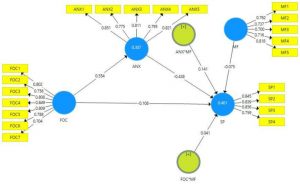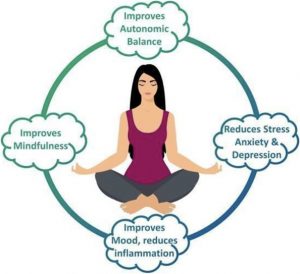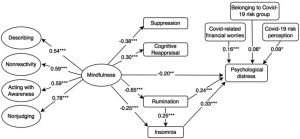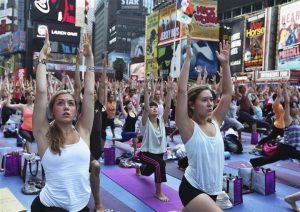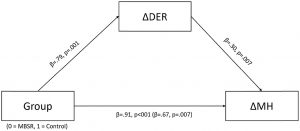Mindfulness is Associated with Greater Psychological Well-Being
By John M. de Castro, Ph.D.
“If you want to conquer the anxiety of life, live in the moment, live in the breath.” ― Amit Ray
The primary focus of the majority of research on mindfulness has been on its ability to treat negative emotional states such as anxiety, depression, and perceived stress. As such, it has been found to be effective for a large array of medical and psychiatric conditions, either stand-alone or in combination with more traditional therapies. But mindfulness training has also been shown to improve health and well-being in healthy individuals. Indeed, it is possible that the effectiveness of mindfulness training in relieving mental and physical illness may result from its ability to improve positive psychological states.
In today’s Research News article “Could mindfulness diminish mental health disorders? The serial mediating role of self-compassion and psychological well-being.” (See summary below or view the full text of the study at: https://www.ncbi.nlm.nih.gov/pmc/articles/PMC9362435/ ) Tran and colleagues, during the Covid-19 pandemic, sent an online survey to university students and again after 15 days measuring mindfulness, self-compassion, anxiety, depression, stress, and psychological well-being. Students who practiced mindfulness were followed up with structured qualitative reports.
They found that the higher the levels of mindfulness the lower the levels of stress, anxiety, and depression, and the higher the levels of self-compassion, and psychological well-being. They also report that mindfulness has direct relationships with lower levels of stress, anxiety, and depression and also indirect relationships. Mindfulness was associated with higher levels of self-compassion which in turn was associated with higher levels of psychological well-being which in turn was associated with lower levels of stress, anxiety, and depression. The qualitative results corroborated these findiings.
These results suggest that the anxiety, depression, and stress that occurred during the Covid-19 pandemic are less in mindful students and suggests that these relationships are partially mediated by mindful people having higher levels of self-compassion and psychological well-being.
“The way to live in the present is to remember that ‘This too shall pass.’ When you experience joy, remembering that ‘This too shall pass’ helps you savor the here and now. When you experience pain and sorrow, remembering that ‘This too shall pass’ reminds you that grief, like joy, is only temporary.” – Joey Green
CMCS – Center for Mindfulness and Contemplative Studies
This and other Contemplative Studies posts are also available on Twitter @MindfulResearch
Study Summary
Tran MAQ, Vo-Thanh T, Soliman M, Ha AT, Van Pham M. Could mindfulness diminish mental health disorders? The serial mediating role of self-compassion and psychological well-being. Curr Psychol. 2022 Aug 3:1-14. doi: 10.1007/s12144-022-03421-3. Epub ahead of print. PMID: 35967505; PMCID: PMC9362435.
Abstract
The COVID-19 pandemic clearly has various detrimental psychological effects on people’s mental health, emphasizing the importance of mindfulness in overcoming such repercussions. This is in line with the growing number of studies that have been conducted to assess the effects of mindfulness in diverse settings. However, the role of mindfulness in reducing mental health issues among university students has received little attention. Therefore, the current work seeks to investigate how mindfulness could reduce the anxiety, depression, and stress of university students and how self-compassion and psychological well-being could mediate the links between mindfulness and these mental health disorders. To that end, an explanatory sequential mixed-method design was adopted. Quantitative data collected, through a two-wave survey, from 560 Vietnamese students having an average age of 18.7 years were used to test the hypotheses. To measure the six variables in the research models, we opted for the Five Facet Mindfulness Questionnaire (FFMQ), Self-Compassion Scale (SCS-26), Depression Anxiety Stress Scale (DASS-21–7 items for each subscale), and World Health Organization-Five Well-Being Index (WHO-5). Additionally, qualitative data from 19 in-depth interviews were utilized to explain the quantitative findings and explore students’ experiences in practicing mindfulness and self-compassion to decrease stress, depression, and anxiety. The results elucidated that self-compassion and psychological well-being serially mediated the relationships between mindfulness (as a predictor) and anxiety, stress, and depression (as outcome variables). The findings demonstrated the key role of mindfulness in increasing students’ self-compassion and psychological well-being as well as reducing anxiety, depression, and stress. This research holds substantial contributions by providing universities and psychotherapists with recommendations to deal with negative psychological consequences caused by COVID-19.
https://www.ncbi.nlm.nih.gov/pmc/articles/PMC9362435/



